Devizes (UK Parliament constituency)
Devizes /dɪvaɪzɪz/ is a constituency in Wiltshire, England, which is represented in the House of Commons of the UK Parliament and includes four towns and many villages in the middle and east of the county.[n 1] The area's representative has been a Conservative since 1924.
| Devizes | |
|---|---|
| County constituency for the House of Commons | |
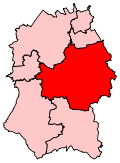 Boundary of Devizes in Wiltshire | |
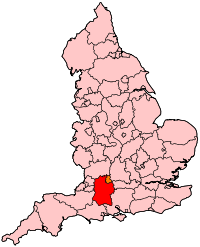 Location of Wiltshire within England | |
| County | Wiltshire |
| Electorate | 68,846 (December 2010)[1] |
| Major settlements | Devizes, Marlborough, Durrington, Pewsey |
| Current constituency | |
| Created | 1885 |
| Member of Parliament | Danny Kruger (Conservative) |
| Number of members | One |
| 1331–1885 | |
| Number of members | Two until 1868, then One |
| Type of constituency | Borough constituency |
History
Until 1885 Devizes was a parliamentary borough, electing two Members of Parliament (MPs) by the bloc vote system until the 1868 election, when the Reform Act 1867 reduced its representation to one MP, elected by the first-past-the-post system of election. The Redistribution of Seats Act 1885 abolished the parliamentary borough, and created a new county constituency of the same name, covering a wider area and electing one member. It has returned a Conservative MP at every election since 1924.
Its most notable MP was Henry Addington, who held the seat during his term as Prime Minister, as well as when he was Speaker of the House of Commons.
Boundaries
1885–1918: The Boroughs of Devizes and Marlborough, the Sessional Divisions of Devizes, Everley, Marlborough, and Ramsey, and part of the Sessional Division of Pewsey.
1918–1950: The Boroughs of Devizes and Marlborough, the Rural Districts of Devizes, Marlborough, Pewsey, and Ramsbury, and part of the Rural District of Highworth.
1950–1983: The Boroughs of Devizes and Marlborough, and the Rural Districts of Devizes, Highworth, Marlborough and Ramsbury, and Pewsey.
1983–1997: The District of Kennet, and the Borough of Thamesdown wards of Blunsdon, Chiseldon, Covingham, Highworth, Ridgeway, St Margaret, St Philip, and Wroughton.
1997–2010: The District of Kennet, the District of North Wiltshire wards of Calne Abberd, Calne Central, Calne North, Calne North East, Calne South, and Calne Without, and the District of West Wiltshire wards of Blackmore Forest, Melksham Forest, Melksham Lambourne, Melksham Roundpoint, Melksham Town, and Melksham Woodrow.
2010–present: The District of Kennet, and the District of Salisbury wards of Bulford and Durrington.
The Devizes constituency covers Devizes in Wiltshire and the surrounding former Kennet district, which includes the towns of Marlborough, Ludgershall and Tidworth, together with the large villages of Bulford, Durrington and Pewsey.
Members of Parliament
1295–1640
1640–1832
| Election | 1st member[7] | 1st party | 2nd member[7] | 2nd party | ||
|---|---|---|---|---|---|---|
| March 1640 | Edward Bayntun | Henry Danvers | ||||
| November 1640 | Edward Bayntun | Robert Nicholas | ||||
| 1653 | Devizes not represented in Barebones Parliament | |||||
| September 1654 | Edward Bayntun | One seat only | ||||
| September 1656 | Edward Scotton | One seat only | ||||
| January 1659 | Chaloner Chute jnr | Edward Scotton | ||||
| March 1660 | William Lewis | Robert Aldworth | ||||
| April 1661 | William Yorke | John Kent | ||||
| December 1666 | John Norden | |||||
| October 1669 | Edward Lewis | George Johnson | ||||
| April 1675 | Sir Edward Bayntun | |||||
| February 1679 | Sir Walter Ernle | |||||
| September 1679 | Sir Giles Hungerford | John Eyles | ||||
| February 1681 | Sir Walter Ernle | George Johnson | ||||
| March 1685 | John Talbot of Lacock | Walter Grubbe | ||||
| January 1689 | Sir William Pynsent | |||||
| March 1690 | Sir Thomas Fowle | |||||
| December 1690 | John Methuen | |||||
| November 1695 | Sir Edward Ernle | |||||
| July 1698 | Sir Francis Child | |||||
| January 1701 | Francis Merewether | |||||
| November 1701 | John Methuen | |||||
| November 1702 | John Child | |||||
| March 1703 | Francis Merewether | |||||
| May 1705 | Sir Francis Child | |||||
| December 1706 | Josiah Diston | |||||
| May 1708 | Paul Methuen | |||||
| October 1710 | Sir Francis Child | Thomas Richmond Webb | ||||
| August 1713 | Robert Child | John Nicholas | ||||
| January 1715 | Josiah Diston | Francis Eyles (expelled) | ||||
| February 1721 | Benjamin Haskins-Stiles | |||||
| March 1722 | Sir Joseph Eyles | Whig | ||||
| August 1727 | Francis Eyles | Whig | ||||
| April 1734 | Sir Joseph Eyles | Whig | ||||
| February 1740 | John Garth | Whig | ||||
| July 1742 | George Lee | Whig | ||||
| July 1747 | William Willy | |||||
| January 1765 | Charles Garth | |||||
| June 1765 | James Sutton | |||||
| September 1780 | Sir James Tylney-Long, 7th Bt. | |||||
| November 1780 | Henry Jones | |||||
| April 1784 | Tory[8] | Henry Addington | Tory[8] | |||
| December 1788 | Joshua Smith | Tory[8] | ||||
| January 1805 | Thomas Grimston Estcourt | Tory[8] | ||||
| June 1818 | John Pearse | Tory[8] | ||||
| March 1826 | George Watson-Taylor | Tory[8] | ||||
1832–1868
| Election | 1st member[7] | 1st party | 2nd member[7] | 2nd party | ||
|---|---|---|---|---|---|---|
| 1832 | Wadham Locke | Whig[9][10][11][8] | Montague Gore | Whig[12][13][8] | ||
| February 1834 | Admiral Sir Philip Charles Durham | Tories[8] | ||||
| December 1834 | Conservative[8] | |||||
| November 1835 | T. H. S. Sotheron-Estcourt | Conservative[8] | ||||
| February 1836 | James Whitley Deans Dundas | Whig[14][15][16][17][8] | ||||
| May 1838 | George Heneage Walker Heneage | Conservative[8] | ||||
| February 1844 | William Heald Ludlow Bruges | Conservative | ||||
| February 1848 | James Bucknall Bucknall-Estcourt | Conservative | ||||
| 1852 | John Neilson Gladstone | Conservative | ||||
| 1857 | Simon Watson Taylor | Peelite[18][19] | Christopher Darby Griffith | Conservative | ||
| 1859 | John Neilson Gladstone | Conservative | ||||
| Feb 1863 | William Addington | Conservative | ||||
| Apr 1864 | Sir Thomas Bateson, Bt. | Conservative | ||||
| 1868 | Second Reform Act: representation reduced to one member | |||||
Since 1868
Devizes has been a safe Conservative seat since 1945. The current Member of Parliament is Danny Kruger who was first elected at the 2019 general election, succeeding Claire Perry, who had stood down at that election after nine years of holding the seat.[20]
| Election | Member[7] | Party | |
|---|---|---|---|
| 1868 | Sir Thomas Bateson | Conservative | |
| 1885 | Walter Long | Conservative | |
| 1892 | Charles Hobhouse | Liberal | |
| 1895 | Edward Goulding | Conservative | |
| 1906 | Francis Rogers | Liberal | |
| 1910 | Basil Peto | Unionist | |
| 1918 | Cory Bell | Unionist | |
| 1923 | Eric Macfadyen | Liberal | |
| 1924 | Percy Hurd | Conservative | |
| 1945 | Christopher Hollis | Conservative | |
| 1955 | Percivall Pott | Conservative | |
| 1964 | Charles Morrison | Conservative | |
| 1992 | Michael Ancram | Conservative | |
| 2010 | Claire Perry | Conservative | |
| 2019 | Danny Kruger | Conservative | |
Fictional Member of Parliament
Devizes was the stated constituency of fictional Conservative MP The Honourable Sir Piers Fletcher-Dervish, Baronet, later Junior Minister for Housing, in the TV sitcom The New Statesman, which was produced and set during the same decade (1980s) that Charles Andrew Morrison was MP for the real-life seat. He was portrayed by actor Michael Troughton.
Elections
Elections in the 2010s
| Party | Candidate | Votes | % | ± | |
|---|---|---|---|---|---|
| Conservative | Danny Kruger | 32,150 | 63.1 | +0.4 | |
| Liberal Democrats | Jo Waltham | 8,157 | 16.0 | +6.7 | |
| Labour | Rachael Schneider | 7,838 | 15.4 | -5.6 | |
| Green | Emma Dawnay | 2,809 | 5.5 | +2.3 | |
| Majority | 23,983 | 47.1 | +5.4 | ||
| Turnout | 50,954 | 69.4 | -1.4 | ||
| Conservative hold | Swing | -3.15 | |||
| Party | Candidate | Votes | % | ± | |
|---|---|---|---|---|---|
| Conservative | Claire Perry | 31,744 | 62.7 | +5.0 | |
| Labour | Imtiyaz Shaikh | 10,608 | 21.0 | +8.0 | |
| Liberal Democrats | Chris Coleman | 4,706 | 9.3 | +1.2 | |
| UKIP | Timothy Page | 1,706 | 3.4 | −12.0 | |
| Green | Emma Dawnay | 1,606 | 3.2 | −2.6 | |
| Wessex Regionalist | Jim Gunter | 223 | 0.4 | N/A | |
| Majority | 21,136 | 41.7 | −0.6 | ||
| Turnout | 50,593 | 71.1 | +0.3 | ||
| Conservative hold | Swing | −1.5 | |||
| Party | Candidate | Votes | % | ± | |
|---|---|---|---|---|---|
| Conservative | Claire Perry | 28,295 | 57.7 | +2.7 | |
| UKIP | David Pollitt | 7,544 | 15.4 | +10.9 | |
| Labour | Chris Watts | 6,360 | 13.0 | +2.8 | |
| Liberal Democrats | Manda Rigby | 3,954 | 8.1 | −18.9 | |
| Green | Emma Dawnay[24] | 2,853 | 5.8 | +4.1 | |
| Majority | 20,751 | 42.3 | +14.2 | ||
| Turnout | 49,006 | 70.8 | +2.0 | ||
| Conservative hold | Swing | ||||
| Party | Candidate | Votes | % | ± | |
|---|---|---|---|---|---|
| Conservative | Claire Perry | 25,519 | 55.1 | +4.0 | |
| Liberal Democrats | Fiona Hornby | 12,514 | 27.0 | +4.7 | |
| Labour | Junab Ali | 4,711 | 10.2 | −12.2 | |
| UKIP | Patricia Bryant | 2,076 | 4.5 | +0.2 | |
| Green | Mark Fletcher | 813 | 1.8 | N/A | |
| Independent | Martin Houlden | 566 | 1.2 | N/A | |
| Libertarian | Nic Coome | 141 | 0.3 | N/A | |
| Majority | 13,005 | 28.1 | +4.6 | ||
| Turnout | 46,340 | 68.8 | +3.5 | ||
| Conservative hold | Swing | −0.3 | |||
Elections in the 2000s
| Party | Candidate | Votes | % | ± | |
|---|---|---|---|---|---|
| Conservative | Michael Ancram | 27,253 | 48.5 | +1.3 | |
| Liberal Democrats | Fiona Hornby | 14,059 | 25.0 | +2.9 | |
| Labour | Sharon Charity | 12,519 | 22.3 | −2.6 | |
| UKIP | Alan Wood | 2,315 | 4.1 | +1.2 | |
| Majority | 13,194 | 23.5 | +1.2 | ||
| Turnout | 56,146 | 65.2 | +1.0 | ||
| Conservative hold | Swing | −0.8 | |||
| Party | Candidate | Votes | % | ± | |
|---|---|---|---|---|---|
| Conservative | Michael Ancram | 25,159 | 47.2 | +4.4 | |
| Labour | Jim Thorpe | 13,263 | 24.9 | +0.7 | |
| Liberal Democrats | Helen Frances | 11,756 | 22.1 | -4.5 | |
| UKIP | Alan Wood | 1,521 | 2.9 | +1.8 | |
| Independent | Ludovic Kennedy | 1,078 | 2.0 | N/A | |
| Monster Raving Loony | Long Tall Sally Potter | 472 | 0.9 | N/A | |
| Majority | 11,896 | 22.3 | +6.0 | ||
| Turnout | 53,249 | 64.2 | −10.5 | ||
| Conservative hold | Swing | ||||
Elections in the 1990s
| Party | Candidate | Votes | % | ± | |
|---|---|---|---|---|---|
| Conservative | Michael Ancram | 25,710 | 42.8 | -11.5 | |
| Liberal Democrats | Antony Vickers | 15,928 | 26.5 | +0.1 | |
| Labour | Frank Jeffrey | 14,551 | 24.2 | +3.4 | |
| Referendum | John Goldsmith | 3,021 | 5.0 | N/A | |
| UKIP | S. Oram | 622 | 1.0 | N/A | |
| Natural Law | Stephen Haysom | 204 | 0.3 | N/A | |
| Majority | 9,782 | 16.3 | -10.6 | ||
| Turnout | 60,036 | 74.7 | -7.0 | ||
| Conservative hold | Swing | ||||
| Party | Candidate | Votes | % | ± | |
|---|---|---|---|---|---|
| Conservative | Michael Ancram | 39,090 | 53.3 | −1.4 | |
| Liberal Democrats | Jane L. Mactaggart | 19,378 | 26.4 | −1.5 | |
| Labour | Rosemary J. Berry | 13,060 | 17.8 | +0.5 | |
| Liberal | S. C. Coles | 962 | 1.3 | −26.6 | |
| Green | David Ripley | 808 | 1.1 | +1.1 | |
| Majority | 19,712 | 26.9 | 0.0 | ||
| Turnout | 73,298 | 81.7 | +4.5 | ||
| Conservative hold | Swing | +0.0 | |||
Elections in the 1980s
| Party | Candidate | Votes | % | ± | |
|---|---|---|---|---|---|
| Conservative | Charles Morrison | 36,372 | 54.78 | ||
| Liberal | Linda Siegle | 18,542 | 27.92 | ||
| Labour | Richard Buxton | 11,487 | 17.30 | ||
| Majority | 17,830 | 26.85 | |||
| Turnout | 77.17 | ||||
| Conservative hold | Swing | ||||
| Party | Candidate | Votes | % | ± | |
|---|---|---|---|---|---|
| Conservative | Charles Morrison | 33,644 | 53.95 | ||
| SDP | E. Palmer | 18,020 | 28.89 | ||
| Labour | D. Hulme | 10,468 | 16.78 | ||
| Wessex Regionalist | G. Ewen | 234 | 0.38 | ||
| Majority | 15,624 | 25.05 | |||
| Turnout | 74.95 | ||||
| Conservative hold | Swing | ||||
Elections in the 1970s
| Party | Candidate | Votes | % | ± | |
|---|---|---|---|---|---|
| Conservative | Charles Morrison | 32,439 | 50.92 | ||
| Labour | V. E. Finlayson | 16,351 | 25.67 | ||
| Liberal | Jack Ainslie | 14,059 | 22.07 | ||
| Ecology | R. Burcham | 713 | 1.12 | ||
| Wessex Regionalist | A. B. Mockler | 142 | 0.22 | ||
| Majority | 16,088 | 25.25 | |||
| Turnout | 79.60 | ||||
| Conservative hold | Swing | ||||
| Party | Candidate | Votes | % | ± | |
|---|---|---|---|---|---|
| Conservative | Charles Morrison | 24,842 | 42.45 | ||
| Labour | V. E. Finlayson | 17,821 | 30.46 | ||
| Liberal | Jack Ainslie | 15,851 | 27.09 | ||
| Majority | 7,021 | 12.00 | |||
| Turnout | 75.22 | ||||
| Conservative hold | Swing | ||||
| Party | Candidate | Votes | % | ± | |
|---|---|---|---|---|---|
| Conservative | Charles Morrison | 27,878 | 44.53 | ||
| Labour | Richard Faulkner | 17,980 | 28.72 | ||
| Liberal | J. Crawford | 16,753 | 26.76 | ||
| Majority | 9,898 | 15.81 | |||
| Turnout | 81.29 | ||||
| Conservative hold | Swing | ||||
| Party | Candidate | Votes | % | ± | |
|---|---|---|---|---|---|
| Conservative | Charles Morrison | 28,475 | 51.65 | ||
| Labour | Richard Faulkner | 20,442 | 37.08 | ||
| Liberal | John Jones | 6,210 | 11.26 | ||
| Majority | 8,033 | 14.57 | |||
| Turnout | 76.15 | ||||
| Conservative hold | Swing | ||||
Elections in the 1960s
| Party | Candidate | Votes | % | ± | |
|---|---|---|---|---|---|
| Conservative | Charles Morrison | 21,429 | 44.65 | ||
| Labour | Ian Hamilton | 18,832 | 39.24 | ||
| Liberal | Michael Patrick Fogarty | 7,730 | 16.11 | ||
| Majority | 2,597 | 5.41 | |||
| Turnout | 81.02 | ||||
| Conservative hold | Swing | ||||
| Party | Candidate | Votes | % | ± | |
|---|---|---|---|---|---|
| Conservative | Charles Morrison | 21,118 | 46.75 | ||
| Labour | Irving H. H. Rogers | 17,170 | 38.01 | ||
| Liberal | Michael Patrick Fogarty | 6,881 | 15.23 | ||
| Majority | 3,948 | 8.74 | |||
| Turnout | 81.37 | ||||
| Conservative hold | Swing | ||||
| Party | Candidate | Votes | % | ± | |
|---|---|---|---|---|---|
| Conservative | Charles Morrison | 19,554 | 46.87 | -4.54 | |
| Labour | I. H. H. Rogers | 17,884 | 42.87 | +1.0 | |
| Liberal | Michael Patrick Fogarty | 4,281 | 10.26 | +3.53 | |
| Majority | 1,670 | 4.0 | -5.54 | ||
| Turnout | 41,719 | ||||
| Conservative hold | Swing | ||||
Elections in the 1950s
| Party | Candidate | Votes | % | ± | |
|---|---|---|---|---|---|
| Conservative | Percivall Pott | 20,682 | 51.41 | -1.28 | |
| Labour | Wilfrid Edward Cave | 16,844 | 41.87 | -5.45 | |
| Independent Liberal | Jack Norton | 2,707 | 6.73 | N/A | |
| Majority | 3,838 | 9.54 | |||
| Turnout | 79.23 | ||||
| Conservative hold | Swing | ||||
| Party | Candidate | Votes | % | ± | |
|---|---|---|---|---|---|
| Conservative | Percivall Pott | 20,317 | 52.69 | +0.77 | |
| Labour | Wilfrid Edward Cave | 18,242 | 47.31 | -0.67 | |
| Majority | 2,075 | 5.38 | |||
| Turnout | 78.62 | ||||
| Conservative hold | Swing | ||||
| Party | Candidate | Votes | % | ± | |
|---|---|---|---|---|---|
| Conservative | Christopher Hollis | 20,319 | 52.02 | +6.76 | |
| Labour | Wilfrid Edward Cave | 18,742 | 47.98 | +5.8 | |
| Majority | 1,577 | 4.04 | |||
| Turnout | 81.41 | ||||
| Conservative hold | Swing | ||||
| Party | Candidate | Votes | % | ± | |
|---|---|---|---|---|---|
| Conservative | Christopher Hollis | 17,401 | 45.26 | -1.74 | |
| Labour | Wilfrid Edward Cave | 16,216 | 42.18 | +12.28 | |
| Liberal | Richard William Thomas Aston | 4,832 | 12.57 | -10.53 | |
| Majority | 1,185 | 3.08 | |||
| Turnout | 82.11 | ||||
| Conservative hold | Swing | ||||
Elections in the 1940s
| Party | Candidate | Votes | % | ± | |
|---|---|---|---|---|---|
| Conservative | Christopher Hollis | 12,796 | 47.0 | -12.32 | |
| Labour | Wilfrid Edward Cave | 8,120 | 29.9 | N/A | |
| Liberal | Frances Josephy | 6,278 | 23.1 | -17.58 | |
| Majority | 4,676 | 17.1 | |||
| Turnout | 67.6 | ||||
| Conservative hold | Swing | ||||
General election 1939/40: Another general election was required to take place before the end of 1940. The political parties had been making preparations for an election to take place from 1939 and by the end of this year, the following candidates had been selected;
- Conservative: Percy Hurd,
- Liberal: Frances Josephy
Elections in the 1930s
| Party | Candidate | Votes | % | ± | |
|---|---|---|---|---|---|
| Conservative | Percy Hurd | 14,438 | 59.32 | ||
| Liberal | Frances Josephy | 9,903 | 40.68 | ||
| Majority | 4,535 | 18.63 | |||
| Turnout | 72.20 | ||||
| Conservative hold | Swing | ||||
| Party | Candidate | Votes | % | ± | |
|---|---|---|---|---|---|
| Conservative | Percy Hurd | 16,702 | 66.27 | ||
| Liberal | Joseph William Molden | 8,501 | 33.73 | ||
| Majority | 8,201 | 32.54 | |||
| Turnout | 76.20 | ||||
| Conservative hold | Swing | ||||
Elections in the 1920s
| Party | Candidate | Votes | % | ± | |
|---|---|---|---|---|---|
| Unionist | Percy Hurd | 11,979 | 47.8 | −13.1 | |
| Liberal | Eric Macfadyen | 10,728 | 42.7 | +3.6 | |
| Labour | R. P. Sheppard | 2,391 | 9.5 | N/A | |
| Majority | 1,251 | 5.1 | −16.7 | ||
| Turnout | 25,098 | 77.5 | +1.3 | ||
| Registered electors | 32,371 | ||||
| Unionist hold | Swing | −8.4 | |||
| Party | Candidate | Votes | % | ± | |
|---|---|---|---|---|---|
| Unionist | Percy Hurd | 12,157 | 60.9 | +12.7 | |
| Liberal | Eric Macfadyen | 7,807 | 39.1 | −12.7 | |
| Majority | 4,350 | 21.8 | N/A | ||
| Turnout | 19,964 | 76.2 | +6.7 | ||
| Registered electors | 26,195 | ||||
| Unionist gain from Liberal | Swing | +12.7 | |||
| Party | Candidate | Votes | % | ± | |
|---|---|---|---|---|---|
| Liberal | Eric Macfadyen | 9,202 | 51.8 | +11.1 | |
| Unionist | Cory Bell | 8,574 | 48.2 | −11.1 | |
| Majority | 628 | 3.6 | N/A | ||
| Turnout | 17,776 | 69.5 | +4.6 | ||
| Registered electors | 25,588 | ||||
| Liberal gain from Unionist | Swing | +11.1 | |||
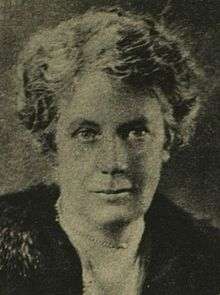
| Party | Candidate | Votes | % | ± | |
|---|---|---|---|---|---|
| Unionist | Cory Bell | 9,598 | 59.3 | −4.5 | |
| Liberal | Hilda Beatrice Currie | 6,576 | 40.7 | +4.5 | |
| Majority | 3,020 | 18.6 | −9.0 | ||
| Turnout | 16,174 | 64.9 | +11.8 | ||
| Registered electors | 24,937 | ||||
| Unionist hold | Swing | −4.5 | |||
Elections in the 1910s
| Party | Candidate | Votes | % | ± | |
|---|---|---|---|---|---|
| C | Unionist | Cory Bell | 8,512 | 63.8 | +9.2 |
| Liberal | James Currie | 4,823 | 36.2 | −9.2 | |
| Majority | 3,689 | 27.6 | +18.4 | ||
| Turnout | 13,335 | 53.1 | −34.0 | ||
| Registered electors | 25,091 | ||||
| Unionist hold | Swing | +9.2 | |||
| C indicates candidate endorsed by the coalition government. | |||||
Election results 1885–1918
Elections in the 1880s
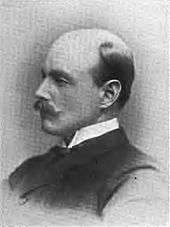
| Party | Candidate | Votes | % | ± | |
|---|---|---|---|---|---|
| Conservative | Walter Long | 3,849 | 50.6 | −2.9 | |
| Liberal | William Barber | 3,752 | 49.4 | +2.9 | |
| Majority | 97 | 1.2 | −5.8 | ||
| Turnout | 7,601 | 81.2 | −10.1 | ||
| Registered electors | 9,357 | ||||
| Conservative hold | Swing | −2.9 | |||
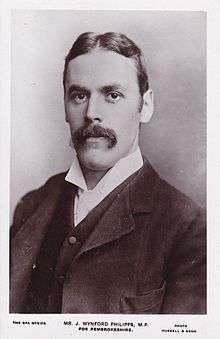
| Party | Candidate | Votes | % | ± | |
|---|---|---|---|---|---|
| Conservative | Walter Long | 4,123 | 63.2 | +12.6 | |
| Liberal | John Philipps | 2,397 | 36.8 | −12.6 | |
| Majority | 1,726 | 26.4 | +25.2 | ||
| Turnout | 6,520 | 69.7 | −11.5 | ||
| Registered electors | 9,357 | ||||
| Conservative hold | Swing | +12.6 | |||
Elections in the 1890s
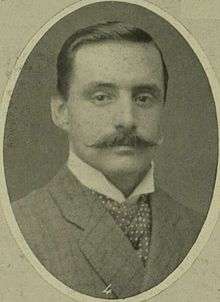
| Party | Candidate | Votes | % | ± | |
|---|---|---|---|---|---|
| Liberal | Charles Hobhouse | 3,896 | 50.9 | +14.1 | |
| Conservative | Walter Long | 3,758 | 49.1 | −14.1 | |
| Majority | 138 | 1.8 | N/A | ||
| Turnout | 7,654 | 76.6 | +6.9 | ||
| Registered electors | 9,987 | ||||
| Liberal gain from Conservative | Swing | +14.1 | |||
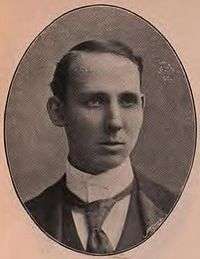
| Party | Candidate | Votes | % | ± | |
|---|---|---|---|---|---|
| Conservative | Edward Goulding | 4,114 | 53.1 | +4.0 | |
| Liberal | Charles Hobhouse | 3,637 | 46.9 | -4.0 | |
| Majority | 477 | 6.2 | N/A | ||
| Turnout | 7,751 | 84.7 | +8.1 | ||
| Registered electors | 9,156 | ||||
| Conservative gain from Liberal | Swing | +4.0 | |||
Elections in the 1900s
| Party | Candidate | Votes | % | ± | |
|---|---|---|---|---|---|
| Conservative | Edward Goulding | 3,738 | 54.6 | +1.5 | |
| Liberal | Francis Rogers | 3,111 | 45.4 | −1.5 | |
| Majority | 627 | 9.2 | +3.0 | ||
| Turnout | 6,849 | 77.8 | −6.9 | ||
| Registered electors | 8,807 | ||||
| Conservative hold | Swing | +1.5 | |||
| Party | Candidate | Votes | % | ± | |
|---|---|---|---|---|---|
| Liberal | Francis Rogers | 4,247 | 53.9 | +8.5 | |
| Conservative | Godfrey Dalrymple-White | 3,633 | 46.1 | -8.5 | |
| Majority | 614 | 7.8 | N/A | ||
| Turnout | 7,880 | 87.7 | +9.9 | ||
| Registered electors | 8,988 | ||||
| Liberal gain from Conservative | Swing | +8.5 | |||
Elections in the 1910s
| Party | Candidate | Votes | % | ± | |
|---|---|---|---|---|---|
| Conservative | Basil Peto | 4,709 | 55.7 | +9.6 | |
| Liberal | Francis Rogers | 3,742 | 44.3 | −9.6 | |
| Majority | 967 | 11.4 | N/A | ||
| Turnout | 8,451 | 91.1 | +3.4 | ||
| Registered electors | 9,277 | ||||
| Conservative gain from Liberal | Swing | +9.6 | |||
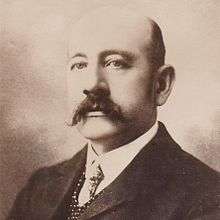
| Party | Candidate | Votes | % | ± | |
|---|---|---|---|---|---|
| Conservative | Basil Peto | 4,408 | 54.6 | -1.1 | |
| Liberal | Sidney Job Pocock | 3,670 | 45.4 | +1.1 | |
| Majority | 738 | 9.2 | -2.2 | ||
| Turnout | 8,078 | 87.1 | −4.0 | ||
| Registered electors | 9,277 | ||||
| Conservative hold | Swing | -1.1 | |||
General election 1914/15:
Another general election was required to take place before the end of 1915. The political parties had been making preparations for an election to take place and by the July 1914, the following candidates had been selected;
- Unionist: Basil Peto
- Liberal: James Currie[42]
Election results 1868–1880
Elections in the 1860s
Seat reduced to one member
| Party | Candidate | Votes | % | ± | |
|---|---|---|---|---|---|
| Conservative | Thomas Bateson | 385 | 52.0 | −2.4 | |
| Liberal | John Webb Probyn[44] | 321 | 43.4 | +43.4 | |
| Conservative | Christopher Darby Griffith | 34 | 4.6 | −41.0 | |
| Majority | 64 | 8.6 | −37.0 | ||
| Turnout | 740 | 86.2 | +39.8 | ||
| Registered electors | 858 | ||||
| Conservative hold | Swing | −22.9 | |||
Elections in the 1870s
| Party | Candidate | Votes | % | ± | |
|---|---|---|---|---|---|
| Conservative | Thomas Bateson | 396 | 52.0 | +0.0 | |
| Conservative | Christopher Darby Griffith | 364 | 47.8 | +43.2 | |
| Ind. Conservative | Sidney Fitzroy Kelly Sloper[45] | 2 | 0.3 | N/A | |
| Majority | 32 | 4.2 | −4.4 | ||
| Turnout | 762 | 84.5 | −1.7 | ||
| Registered electors | 902 | ||||
| Conservative hold | Swing | N/A | |||
Elections in the 1880s
| Party | Candidate | Votes | % | ± | |
|---|---|---|---|---|---|
| Conservative | Thomas Bateson | 446 | 53.5 | +1.5 | |
| Liberal | Albert Meysey-Thompson[46] | 388 | 46.5 | N/A | |
| Majority | 58 | 7.0 | +2.8 | ||
| Turnout | 834 | 91.3 | +6.8 | ||
| Registered electors | 913 | ||||
| Conservative hold | Swing | N/A | |||
Election results 1832–1868
| Party | Candidate | Votes | % | ± | |
|---|---|---|---|---|---|
| Whig | Wadham Locke | 216 | 45.4 | N/A | |
| Whig | Montague Gore | 166 | 34.9 | N/A | |
| Tory | Philip Charles Durham | 94 | 19.7 | N/A | |
| Majority | 72 | 15.1 | N/A | ||
| Turnout | 276 | 87.6 | N/A | ||
| Registered electors | 315 | ||||
| Whig gain from Tory | Swing | N/A | |||
| Whig gain from Tory | Swing | N/A | |||
Gore resigned after defecting to the Tories, causing a by-election.
| Party | Candidate | Votes | % | ± | |
|---|---|---|---|---|---|
| Tory | Philip Charles Durham | Unopposed | |||
| Tory gain from Whig | |||||
| Party | Candidate | Votes | % | ± | |
|---|---|---|---|---|---|
| Whig | Wadham Locke | 240 | 49.0 | +3.6 | |
| Conservative | Philip Charles Durham | 154 | 31.4 | +11.7 | |
| Whig | Philip Pleydell-Bouverie | 96 | 19.6 | −15.3 | |
| Turnout | 260 | 83.6 | −4.0 | ||
| Registered electors | 311 | ||||
| Majority | 86 | 17.6 | +2.5 | ||
| Whig hold | Swing | −1.1 | |||
| Majority | 58 | 11.8 | N/A | ||
| Conservative gain from Whig | Swing | +11.7 | |||
Locke's death caused a by-election.
| Party | Candidate | Votes | % | ± | |
|---|---|---|---|---|---|
| Conservative | T. H. S. Bucknall-Estcourt | 157 | 52.0 | +20.6 | |
| Whig | James Whitley Deans Dundas | 145 | 48.0 | −20.6 | |
| Majority | 12 | 4.0 | −7.8 | ||
| Turnout | 302 | 88.0 | +4.4 | ||
| Registered electors | 343 | ||||
| Conservative gain from Whig | Swing | +20.6 | |||
Durham resigned, causing a by-election.
| Party | Candidate | Votes | % | ± | |
|---|---|---|---|---|---|
| Whig | James Whitley Deans Dundas | Unopposed | |||
| Whig gain from Conservative | |||||
| Party | Candidate | Votes | % | ± | |
|---|---|---|---|---|---|
| Whig | James Whitley Deans Dundas | Unopposed | |||
| Conservative | T. H. S. Bucknall-Estcourt | Unopposed | |||
| Registered electors | 341 | ||||
| Whig hold | |||||
| Conservative hold | |||||
Dundas was appointed as Clerk of the Ordnance, requiring a by-election.
| Party | Candidate | Votes | % | ± | |
|---|---|---|---|---|---|
| Whig | James Whitley Deans Dundas | 109 | 51.7 | N/A | |
| Conservative | George Heneage Walker Heneage | 102 | 48.3 | N/A | |
| Majority | 7 | 3.3 | N/A | ||
| Turnout | 211 | 79.3 | N/A | ||
| Registered electors | 266 | ||||
| Whig hold | Swing | N/A | |||
- Following the by-election, Dundas was unseated due to bribery and Heneage was declared elected in his place[47]
Elections in the 1840s
| Party | Candidate | Votes | % | ± | |
|---|---|---|---|---|---|
| Conservative | George Heneage Walker Heneage | Unopposed | |||
| Conservative | Thomas Sotheron | Unopposed | |||
| Registered electors | 375 | ||||
| Conservative hold | |||||
| Conservative gain from Whig | |||||
Sotheron resigned, by accepting the office of Steward of the Chiltern Hundreds, in order to contest a by-election at North Wiltshire, causing a by-election.
| Party | Candidate | Votes | % | ± | |
|---|---|---|---|---|---|
| Conservative | William Heald Ludlow Bruges | 202 | 75.1 | N/A | |
| Whig | Christopher Temple | 67 | 24.9 | N/A | |
| Majority | 135 | 50.2 | N/A | ||
| Turnout | 269 | 69.9 | N/A | ||
| Registered electors | 385 | ||||
| Conservative hold | Swing | N/A | |||
| Party | Candidate | Votes | % | ± | |
|---|---|---|---|---|---|
| Conservative | George Heneage Walker Heneage | Unopposed | |||
| Conservative | William Heald Ludlow Bruges | Unopposed | |||
| Registered electors | 389 | ||||
| Conservative hold | |||||
| Conservative hold | |||||
Bruges resigned by accepting the office of Steward of the Chiltern Hundreds, causing a by-election.
| Party | Candidate | Votes | % | ± | |
|---|---|---|---|---|---|
| Conservative | James Bucknall Bucknall Estcourt | Unopposed | |||
| Conservative hold | |||||
Elections in the 1850s
| Party | Candidate | Votes | % | ± | |
|---|---|---|---|---|---|
| Conservative | John Neilson Gladstone | Unopposed | |||
| Conservative | George Heneage Walker Heneage | Unopposed | |||
| Registered electors | 373 | ||||
| Conservative hold | |||||
| Conservative hold | |||||
| Party | Candidate | Votes | % | ± | |
|---|---|---|---|---|---|
| Peelite | Simon Watson Taylor | 230 | 45.4 | N/A | |
| Conservative | Christopher Darby Griffith | 159 | 31.4 | N/A | |
| Conservative | John Neilson Gladstone | 118 | 23.3 | N/A | |
| Majority | 71 | 14.0 | N/A | ||
| Turnout | 254 (est) | 79.5 (est) | N/A | ||
| Registered electors | 319 | ||||
| Peelite gain from Conservative | Swing | N/A | |||
| Conservative hold | Swing | N/A | |||
| Party | Candidate | Votes | % | ± | |
|---|---|---|---|---|---|
| Conservative | John Neilson Gladstone | 171 | 35.2 | +11.9 | |
| Conservative | Christopher Darby Griffith | 167 | 34.4 | +3.0 | |
| Liberal | Simon Watson Taylor | 148 | 30.5 | −14.9 | |
| Majority | 19 | 3.9 | N/A | ||
| Turnout | 243 (est) | 77.4 (est) | −2.1 | ||
| Registered electors | 314 | ||||
| Conservative hold | Swing | +9.7 | |||
| Conservative gain from Peelite | Swing | +5.2 | |||
Elections in the 1860s
Gladstone's death caused a by-election.
| Party | Candidate | Votes | % | ± | |
|---|---|---|---|---|---|
| Conservative | William Addington | 170 | 64.4 | −5.2 | |
| Liberal | John Webb Probyn[44] | 88 | 33.3 | N/A | |
| Liberal | Israel Abrahams[48] | 6 | 2.3 | N/A | |
| Majority | 82 | 31.1 | +27.2 | ||
| Turnout | 264 | 79.8 | +2.4 | ||
| Registered electors | 331 | ||||
| Conservative hold | Swing | N/A | |||
Addington succeeded to the peerage, causing a by-election.
| Party | Candidate | Votes | % | ± | |
|---|---|---|---|---|---|
| Conservative | Thomas Bateson | Unopposed | |||
| Conservative hold | |||||
| Party | Candidate | Votes | % | ± | |
|---|---|---|---|---|---|
| Conservative | Thomas Bateson | 181 | 54.4 | +19.2 | |
| Conservative | Christopher Darby Griffith | 152 | 45.6 | +11.2 | |
| Liberal | John Curling[49] | 0 | 0.0 | −30.5 | |
| Majority | 152 | 45.6 | +41.7 | ||
| Turnout | 167 (est) | 46.4 (est) | −30.8 | ||
| Registered electors | 359 | ||||
| Conservative hold | Swing | +17.2 | |||
| Conservative gain from Liberal | Swing | +13.2 | |||
- Curling retired before polling day.[50]
Election results before 1832
| Party | Candidate | Votes | % | ± | |
|---|---|---|---|---|---|
| Tory | John Pearse | Unopposed | |||
| Tory | George Watson-Taylor | Unopposed | |||
| Registered electors | c. 36 | ||||
| Tory hold | |||||
| Tory hold | |||||
| Party | Candidate | Votes | % | ± | |
|---|---|---|---|---|---|
| Tory | John Pearse | ||||
| Tory | George Watson-Taylor | ||||
| Tory | William Salmon | ||||
| Whig | Wadham Locke | ||||
| Turnout | 30 | c. 83.3 | N/A | ||
| Registered electors | c. 36 | ||||
| Tory hold | |||||
| Tory hold | |||||
- Some sources, including the corporation minutes, do not list Locke or Salmon as candidates. However, they are included here as per Stooks Smith.[8]
External links
Craig, F. W. S. (1983). British parliamentary election results 1918–1949 (3 ed.). Chichester: Parliamentary Research Services. ISBN 0-900178-06-X.
Notes and references
- Notes
- As with all constituencies, Devizes elects one Member of Parliament (MP) by the first past the post system of election at least every five years.
- References
- "Electorate Figures – Boundary Commission for England". 2011 Electorate Figures. Boundary Commission for England. 4 March 2011. Archived from the original on 6 November 2010. Retrieved 13 March 2011.
- "History of Parliament". History of Parliament Trust. Retrieved 24 October 2011.
- "CHANDLER, Robert II, of Devizes, Wilts. | History of Parliament Online".
- Cavill. The English Parliaments of Henry VII 1485–1504.
- "History of Parliament". History of Parliament Trust. Retrieved 24 October 2011.
- "History of Parliament". History of Parliament Trust. Retrieved 24 October 2011.
- Leigh Rayment's Historical List of MPs – Constituencies beginning with "D" (part 2)
- Stooks Smith, Henry (1845). The Parliaments of England, from 1st George I., to the Present Time. Vol II: Oxfordshire to Wales Inclusive. London: Simpkin, Marshall, & Co. pp. 112–114.
- Farrell, Stephen (2009). "Wiltshire". The History of Parliament. Retrieved 6 May 2018.
- "Election Talk". The Spectator. 24 November 1836. p. 13. Retrieved 6 May 2018.
- Roebuck, John Arthur (1835). Pamphlets for the people. [36 political pamphlets, written or ed. by J.A. Roebuck. Wanting the general title-leaves and lists of contents]. p. 11. Retrieved 6 May 2018.
- Disraeli, Benjamin (1982). Gunn, John A. W.; Matthews, John P.; Schurman, Donald M.; Wiebe, Melvin G. (eds.). Benjamin Disraeli Letters: 1835–1837. Toronto: University of Toronto Press. p. 549. ISBN 9781442639546. Retrieved 6 May 2018.
- "The State and Prospects of Toryism". Fraser's Magazine for Town and Country, Volume 9. James Fraser. 1834. p. 368. Retrieved 6 May 2018.
- "Admiral Sir J. W. Deans Dundas GCB". The Gentleman's magazine, Volume 213. 1862. p. 782. Retrieved 6 May 2018.
- Mosse, Richard Bartholomew (1838). The Parliamentary Guide: a concise history of the Members of both Houses, etc. p. 163. Retrieved 6 May 2018.
- Churton, Edward (1838). The Assembled Commons or Parliamentary Biographer: 1838. p. 77. Retrieved 6 May 2018.
- Dod, Charles Roger; Dod, Robert Phipps (1843). Dod's Parliamentary Companion, Volume 11. Dod's Parliamentary Companion. p. 147. Retrieved 6 May 2018.
- "Election Intelligence". Taunton Courier, and Western Advertiser. 18 March 1857. p. 7. Retrieved 6 May 2018 – via British Newspaper Archive.
- "Election Intelligence". Berkshire Chronicle. 14 March 1857. p. 5. Retrieved 6 May 2018 – via British Newspaper Archive.
- "Tories select successor to Ancram". BBC News. 2 November 2009. Retrieved 3 September 2010.
- "General Election 12 December 2019 - Wiltshire Council". www.wiltshire.gov.uk. Retrieved 16 November 2019.
- "Parliamentary elections 2017". Wiltshire Council. Archived from the original on 12 May 2017. Retrieved 13 May 2017.
- "Election Data 2015". Electoral Calculus. Archived from the original on 17 October 2015. Retrieved 17 October 2015.
- "Press release: Green Party announces new candidates for Chippenham and Devizes constituencies". Kennet and North Wiltshire Green Party. 8 February 2015. Retrieved 11 February 2015.
- "Election Data 2010". Electoral Calculus. Archived from the original on 26 July 2013. Retrieved 17 October 2015.
- Kerr, Andrew (20 April 2010). "Statement of Persons Nominated and Notice of Poll" (PDF). Electoral Services. Wiltshire County Council. Archived from the original (PDF) on 17 June 2011. Retrieved 21 April 2010.
- "Election Data 2005". Electoral Calculus. Archived from the original on 15 October 2011. Retrieved 18 October 2015.
- "Election Data 2001". Electoral Calculus. Archived from the original on 15 October 2011. Retrieved 18 October 2015.
- "Election Data 1997". Electoral Calculus. Archived from the original on 15 October 2011. Retrieved 18 October 2015.
- "Election Data 1992". Electoral Calculus. Archived from the original on 15 October 2011. Retrieved 18 October 2015.
- "Politics Resources". Election 1992. Politics Resources. 9 April 1992. Archived from the original on 24 July 2011. Retrieved 6 December 2010.
- "Election Data 1987". Electoral Calculus. Archived from the original on 15 October 2011. Retrieved 18 October 2015.
- "Election Data 1983". Electoral Calculus. Archived from the original on 15 October 2011. Retrieved 18 October 2015.
- "1964 By Election Results". Archived from the original on 31 August 2009. Retrieved 19 September 2015.
- British parliamentary election results, 1918–1949 by FWS Craig.
- Debrett's House of Commons and the Judicial Bench, 1922.
- British Parliamentary Election Results 1885–1918, F. W. S. Craig.
- The Liberal Year Book, 1907.
- Debrett's House of Commons & Judicial Bench, 1886.
- Debrett's House of Commons & Judicial Bench, 1901.
- Debrett's House of Commons & Judicial Bench, 1916.
- Western Daily Press 20 July 1914.
- Craig, F. W. S., ed. (1977). British Parliamentary Election Results 1832–1885 (e-book)
|format=requires|url=(help) (1st ed.). London: Macmillan Press. ISBN 978-1-349-02349-3. - "Devizes Election". Devizes and Wiltshire Gazette. 19 November 1868. p. 3. Retrieved 7 February 2018 – via British Newspaper Archive.
- "Devizes: The Election". Salisbury and Winchester Journal. 7 February 1874. p. 7. Retrieved 29 December 2017 – via British Newspaper Archive.
- "This Evening's News". The Pall Mall Gazette. 8 March 1880. pp. 6–7. Retrieved 25 November 2017 – via British Newspaper Archive.
- "The Coronation". Hampshire Advertiser. 2 June 1838. p. 3. Retrieved 6 May 2018 – via British Newspaper Archive.
- "Devizes Election". Devizes and Wiltshire Gazette. 12 February 1863. p. 2. Retrieved 7 February 2018 – via British Newspaper Archive.
- "Election Intelligence". Reading Mercury. 15 July 1865. p. 6. Retrieved 7 February 2018 – via British Newspaper Archive.
- "Election Intelligence". Dorset County Chronicle. 20 July 1865. p. 12. Retrieved 7 February 2018 – via British Newspaper Archive.
- Farrell, Stephen. "Devizes". The History of Parliament. Retrieved 11 April 2020.
| Parliament of the United Kingdom | ||
|---|---|---|
| Preceded by Cambridge University |
Constituency represented by the Prime Minister 1801–1804 |
Succeeded by Cambridge University |